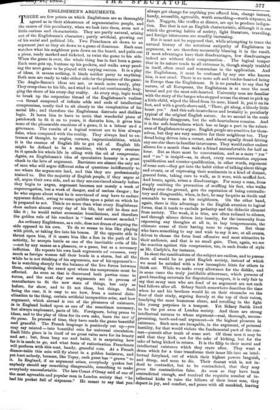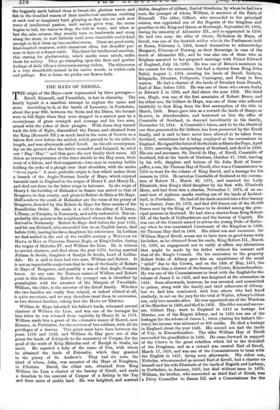ENGLISHMEN'S ARGUMENTS.
THERE are few points on which Englishmen are so thoroughly j_ agreed as in their abhorrence of argumentative people, and the causes of this peculiarity, when we look into them, seem not a little curious and characteristic. They are partly natural, arising out of the Englishman's character ; partly artificial, growing out of his social and political life. Two Frenchmen sit down to an argument just as they sit down to a game of dominoes. Each man watches what his neighbour puts down on the board, and pulls out a piece, ready marked and ticketed, to twist the game to his aide. When the game is over, the whole thing has in fact been a game. Each man gets up, buttons up his pockets, and walks away pend- ing the next game to be played with varying success. It is a play of ideas, it means nothing, it binds neither party to anything. Both men are ready to take either side for the pleasure of the game. The Anglo-Saxon's ideas are not, or much more rarely, play. They creep close to his life, and wind in and out continuously, hug- ging the shore of his every-day reality. At every step, logic tends to break up the serpentine thread of the Englishman's realism —a thread oomposed of infinite odds and ends of intellectual compromises, neatly tied to sit closely to the complexities of his social life ; and therefore the Englishman distrusts and dislikes logic. It bores him to have to untie that wonderful piece of patchwork to fit it on to yours, it disturbs him, it gives him none of the pleasurable emotions of a game, it is a labour and a grievance. The results of a logical contest are to him always false, when compared with the reality. They always lead to ex- tremes of thought, to angles, corners, impracticabilities, which it is the essence of English life to get rid of. English life might be defined to be a machine, which every creature in it spends his whole life in oiling with the oil of compromise. Again, an Englishman's idea of speculative honesty is a great check to the love of argument. Barristers are almost the only set of men who will argue different sides of questions indifferently to see where the arguments lead, and this they are professionally trained to. But the majority of English people, if they argue at all, argue their own side, and as they are convinced already before they begin to argue, argument becomes not merely a work of supererogation, but a work of danger, and of useless danger ; for he who argues about what he is convinced of may have to endure apparent defeat, owing to some quibble upon a point on which he is prepared to act. This is no more than what every Englishman does endure almost every day of his life, but still he does not like it ; he would rather economize humiliations, and therefore the golden rule of his conduct is " least said soonest mended." always got change for anything you offered him, change instant, handy, accessible, agreeable, worth something—worth sixpence, in fact. Nuggets, like truffles at dinner, are apt to produce indiges- tion. But that is not an English characteristic, although it is one which the growing habits of society, light literature, travelling, and foreign intercourse are steadily increasing.
In short the ramifications of the subject are endless, and to pursue them all would be to paint English society, instead of which we must be satisfied with a few incomplete hints for others to think out. While we make every allowance for the dislike, and in some cases the truly justifiable abhorrence, which persons of good-breeding entertain for disputatious tempers, it is only .fair to say that many men who are fond of an argument are not such bad fellows after all. Sidney Smith somewhere describes the time when he and his brothers would lie on their stomachs on the floor of their study, arguing fiercely at the top of their voicee, bandying the most humorous abuse, and revelling in the fight like young porpoises in a tempest. Yet Sidney Smith lived to be the pet even of London society. And there are strong intellectual natures to whom argument—real, thorough, uncom- promising, tooth-and-nail argument—is the highest pleasure in existence. Such men are incapable, in the argument, of personal hostility, for that would violate the fundamental pact of the con- test—pursuit after truth of some sort. Of these men it may be said that they kick, not for the sake of kicking, but for the sake of being kicked in return. It is the fillip to their moral and intellectual existence which they crave after. They want a dram which for a time transforms their inner life into an intel- lectual fairyland, out of which their highest powers languish, and droop, and seem to die. Their dearest wish is, not in- deed to contradict, but to be contradicted, that they may prove the contradiction false. As soon as they have been contradicted enough, and received the requisite number of in- tellectual kicks to raise the billows of their inner seas, they depart in joy, and comfort, and peace with all mankind, Laving
the beggarly earth behind them to breast the glorious waves and fish in the troubled waters of their intellectual emotions, exulting at each real or imaginary haul, glorying as they rise on each new wave of intellectual passion, until nature gives way, the storm begins to lull, the waves to drop, the tide to wane, and when at last the calm returns, they wearily turn to landwards and creep along the shore, to wait listlessly until some charitable soul is kind enough to kick them up into another storm. These are good souls, kind-hearted creatures, noble characters often, but dreadful per- sons to have at a dinner-table. This thirst for intellectual emotion, this craving for gladiatorship, which marks some minds, unfits them for society. They go trampling upon the finer and gentler feelings of daily life as a rhinoceros among violets. The rhinoceros is a very remarkable animal in his native woods, or within rails and palings. But at home we prefer our flower-beds.



































 Previous page
Previous page